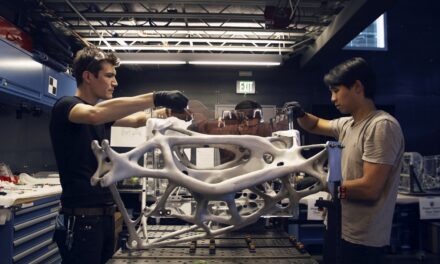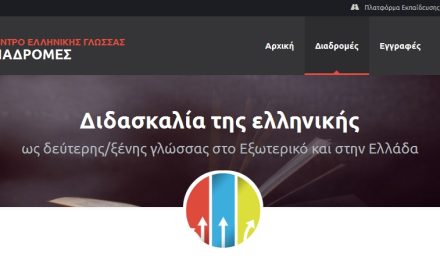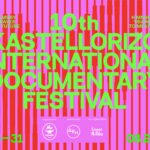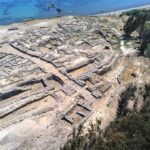The Medical Degree English Program offered by the School of Medicine of the National and Kapodistrian University of Athens (NKUA), was founded in 2020 and began in September 2022. It is a 6-year undergraduate program addressed exclusively to foreign nationals of EU and non-EU countries. Admissions are now open for the academic year 2024-2025, which starts in September 2024 (applications deadline: March 15, 2024).
The program ’s primary goals is to attract the very best, whether they be prospective international students or internationally renowned professors. Courses are delivered in English by world-class tutors in Medical Departments and laboratories located in the University campus, and in 16 University Hospitals that provide daily, high quality health services in the Athens metropolitan area. For clinical training, students can practice in 16 hospitals of the Attica area. The possibility to learn the Greek language is also offered, at the University’s Modern Greek Language Teaching Center.
The University of Athens (named “Kapodistrian” to honor Ioannis Kapodistrias, Greece’s first head of state) is the oldest University of modern Greece, founded in 1837. The School of Medicine was one of the four schools to operate in the university since its establishment. NKUA’s standing is reflected in various international University ranking classifications; for the 7th consecutive year, it is among the top 100 Universities of “Top Universities” by Top Google Scholar Citations.
It should be noted that the National and Kapodistrian University of Athens (in collaboration with the International Hellenic University) was also the first public Greek University to offer an English-language undergraduate program (BA in the Archaeology, History and Literature of Ancient Greece), which welcomed its first international students in September of 2020.
Greek News Agenda spoke* about the Medical Degree English Program with the Director of the program and Dean of NKUA’s School of Medicine, Professor Nikolaos Arkadopoulos, while also taking some statements from the Administrative coordinator of the program, Dr Maria Vardaki.
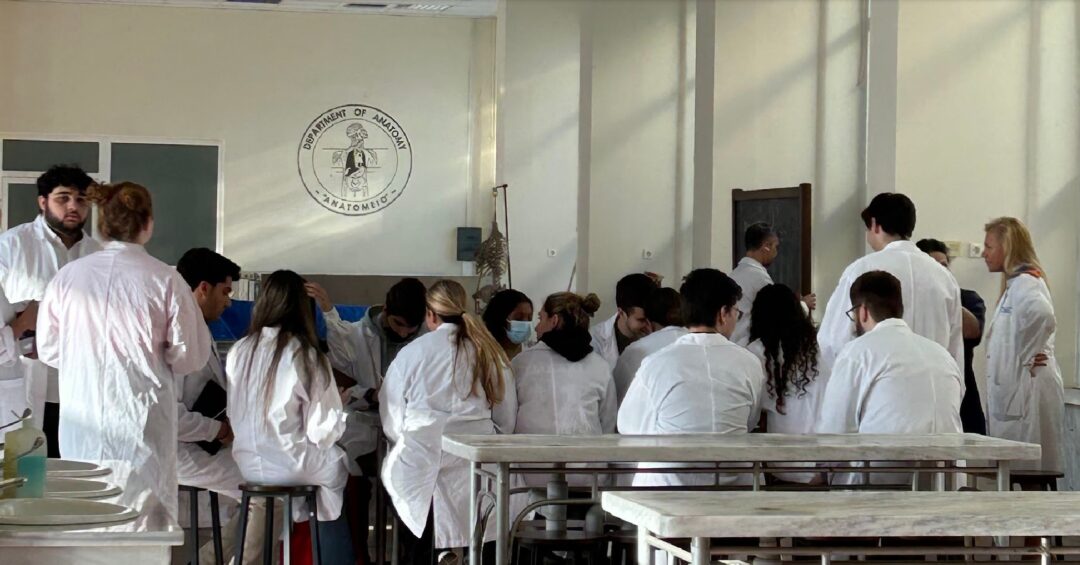
Pr. Arkadopoulos, please tell us what led to the creation of an English-language undergraduate program by the School of Medicine of the University of Athens? To what extent is the content of the program identical to the corresponding program in Greek?
As soon as the legislative framework allowed it, the NKUA had the opportunity to proceed with the establishment of the “Medical Degree”, with the high academic level of the School of Medicine being a guarantee for the success of the program. It is worth noting that our Greek graduates excel in any postgraduate program they choose, in the rest of Europe or in the USA, no matter how competitive. The high level of research work carried out at the School of Medicine is confirmed, among other things, by the many international research projects and the large number of publications in international scientific journals with a high impact index. The objectives of the program are to attract top students from foreign countries and to provide them with the seal of academic excellence of the first medical school in the Balkans. The history and legacy of 187 years, the international reputation of our School and its high position in the world rankings, along with the high academic level of our faculty and research staff (faculty members), led last year to more than 1400 students submitting expressions of interest.
The English-language program has been certified with honors by the National Higher Education Authority, it is a six-year long program and is essentially a mirror program of the 2017 reformed Greek-language program in Medicine at the University of Athens.
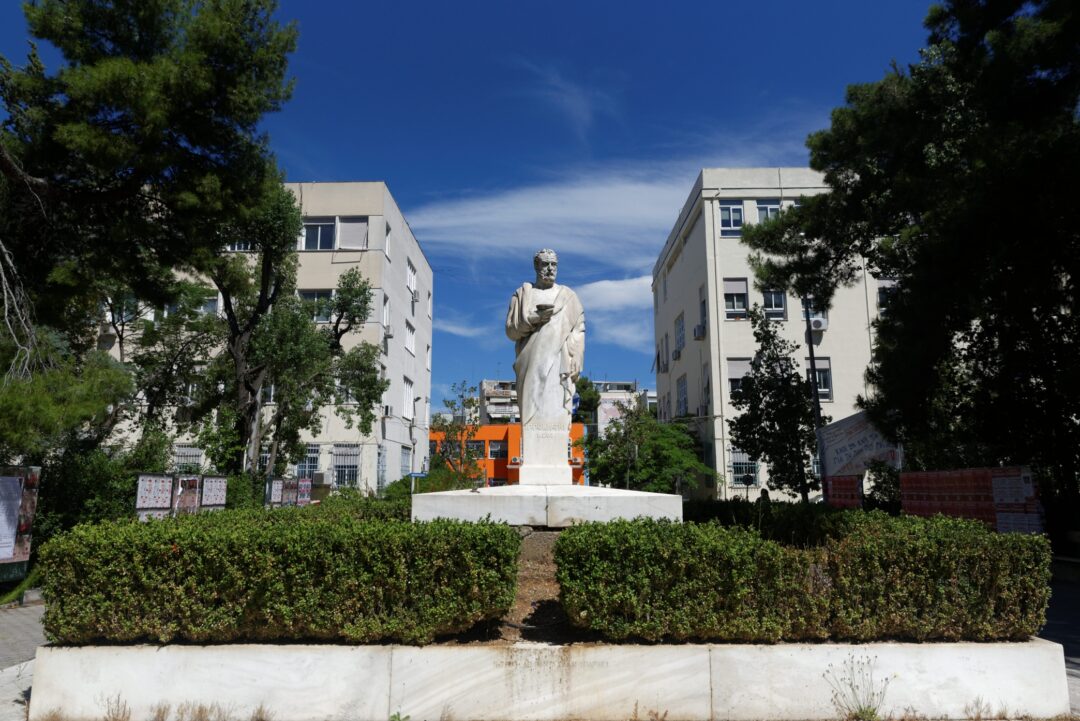
Which do you consider to be the comparative advantages offered to non-Greek students by this program, and by the city of Athens in general?
Let me begin by noting that, two months ago, the data for 2023 from the Open Doors Report on International Educational Exchange placed Greece in 8th place as the most popular destination for American students to study. This is no small achievement when you consider that it is preceded by countries with a strong tradition of higher education, but also with significant advancements in the field of innovation.
It should be pointed out that this program has essentially adopted student-centered learning in order to enable members of the academic and administrative staff to manage the diversity of the student population. In the day-to-day practice of the educational process as implemented in the program, this is achieved through a continuous exchange and collection of information on the progress of students and their performance and in an interactive, ongoing evaluation of the education provided.
An important advantage is that students are trained by the academic staff of the 90 University Clinics and laboratories of the School, which operate in 16 hospitals in Athens. These clinics receive 45% of the patients of the Attica area.
The tuition fees are set at the particularly competitive amount of 13,000 euros per year.
Foreign students have the opportunity to follow high-level courses in the country where most of the sciences originally evolved, along with democracy and culture. Another key advantage of Greece is that its universities have a stronger name in academia than other competitive European countries in central Europe. Our country also benefits from its Mediterranean climate and its reputation as one of the top tourist destinations in Europe.

Would you say that Greece as a country has become a brand name in the field of Medicine (in both the fields of research and medical practice) in SE Europe, but also more broadly?
The School of Medicine of the National and Kapodistrian University of Athens plays a leading role in the continuous effort to advance medical science and health.
Greece, as a country, has emerged as a major player in the field of medicine, encouraging research and education at high levels. Scientists and health professionals in our country actively participate in European and global research programs, contributing to the shaping of the latest developments in medicine.
In the field of research, new scientific discoveries are constantly being made and innovative therapeutic approaches are emerging. Our laboratories are involved in projects that are defining the future of medicine, and our students have the opportunity to contribute directly to this scientific advancement.
NKUA’s School of Medicine continues to lead the way in healthcare with the establishment of 18 Centers of Expertise on Rare Diseases. These centers are sources of excellence, actively collaborating with other centers and networks on a national and European level. The continuous exchange of knowledge and collaboration between these centers enhances our ability to treat rare diseases with specialized and advanced therapeutic approaches.
As Dean of the School of Medicine, I am proud of the role we play in establishing medicine as a brand name for Greece. It is our priority to produce young, skilled scientists in the field of healthcare who will continue to contribute to the global medical community.

How would you describe the response from international students so far? Both in terms of the number of applications, but also in terms of the feedback received from the current students?
The program is in its second year of operation. Over the past two years, students from 64 countries have applied to the program. It is particularly significant that despite our strict admission criteria, over 1400 people submit expressions of interest each year and around 420 applicants submitted complete application files and excellent letters of recommendation.
Regarding the academic performance of our students, because we encourage their participation in research from the first year, it is worth noting, for example, that a sophomore student participated in a research paper published in the Surgical and Radiologic Anatomy journal, and three of our students participated with presentations at a conference.
In addition to the legal admission requirements, each program has set criteria that ensure a high level of admission. Criteria such as passing the BioMedical Admissions Test (BMAT), the Medical College Admission Test (MCAT), a requirement for a high IB score and A*- levels in Chemistry, Physics, Biology courses, completion of a pre-med program or a BSc in related sciences, all of which are guarantees for the successful operation of the program.
My personal experience has been excellent. Everything has been smooth since I first arrived thanks to the faculty and staff. Our curriculum is very well organized and all of our classes are taught in English by dedicated professors always willing to support us. We have quality instruction with informative lectures and labs. I appreciate the University’s mission of internationalization. I have made friends from around the world and I am able to create new experiences while earning my medical degree in one of the best Universities of Greece.
Antonia Vasilopoulos, USA
What is the School of Medicine’s vision for the future of this program? Can you tell us if there are any plans in the works for other international undergraduate programs from the University of Athens?
We will continue to emphasize the quality of educational work, the quality guarantee policies, the strengthening of research, the enhancement of synergies, the development of international cooperation. What we hope for with the Medical Degree English Program is the same that happens with the alumni of our Greek-speaking medical degree: to see that 100% of those who choose to work abroad find a job.
After all, the testimonies of our students make us look to the future with optimism, precisely because of the work that has been done and the recognition that exists, so that any competition acts as a challenge rather than a threat.
There are some programs that are in the process of being accredited, by the School of Dentistry, the Department of Nursing and the Department of Pharmacy.
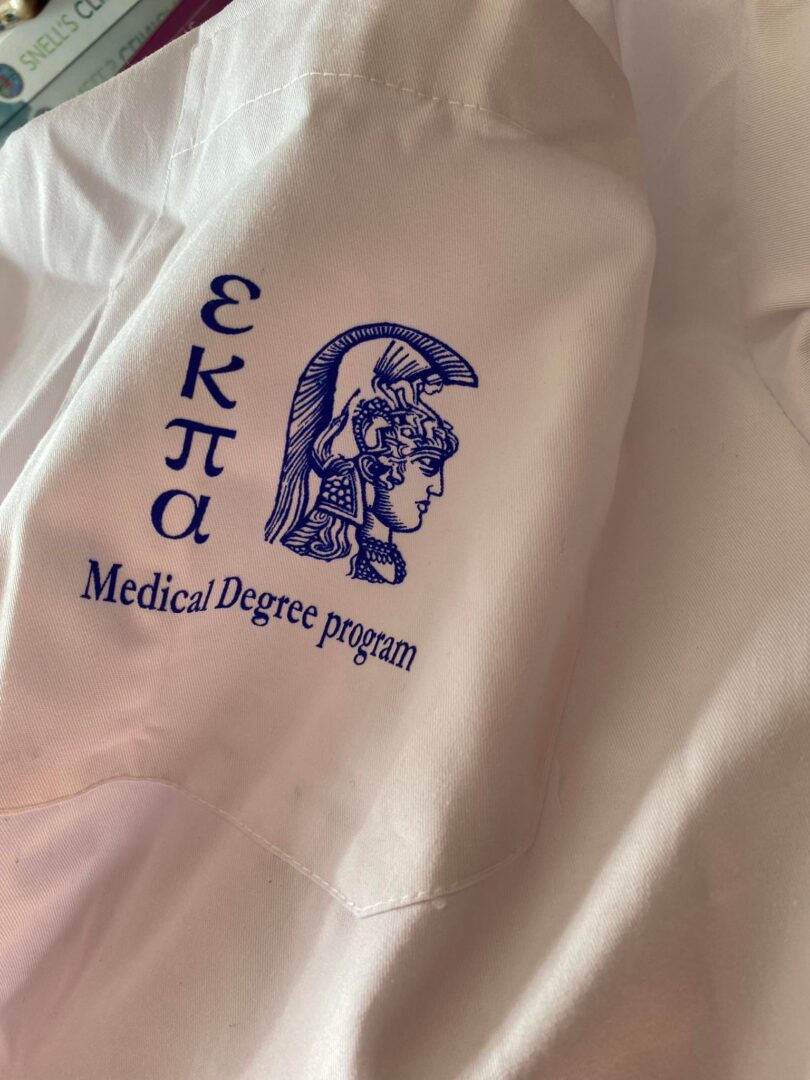
In her statement to GNA, the Administrative coordinator of the program, Dr Maria Vardaki, pointed out that “Every semester students carry out an anonymous evaluation of both the program and the individual classes, but also of the program’s administrative support.” As she explained, the program’s team is particularly pleased that the “students in every evaluation so far have rated the program support with 5/5 and a response time of less than 3 hours to every request between 7:00-23:00 daily – a goal that the staff had also set to the Hellenic Authority for Higher Education.”
As she added, the program’s administrative support team is working with Study in Greece on housing services so that they can respond effectively to this need to cater to international students.
*Interview by Nefeli Mosaidi
Read also via Greek News Agenda: ; Interview with Prof. Karamalengou, academic director of the first English-language university programme on classical studies in Greece; Students from 27 countries at international program AUTh Medical School; Study in Greece | Bachelor’s Degree: Professor Christos Tsatsanis on the International Program in Medicine at the University of Crete
TAGS: EDUCATION | MEDICINE | STUDY IN GREECE




